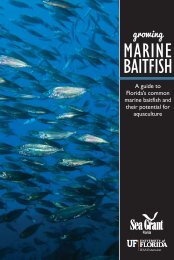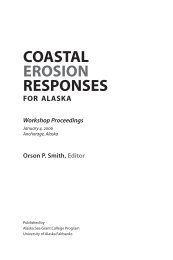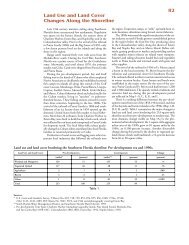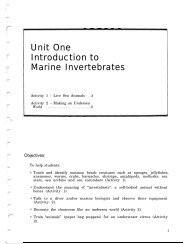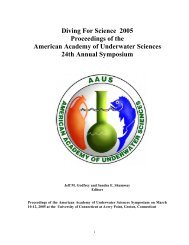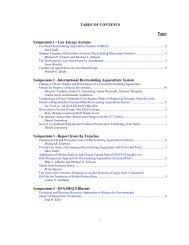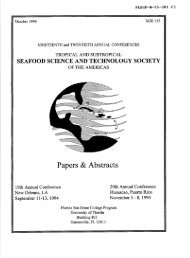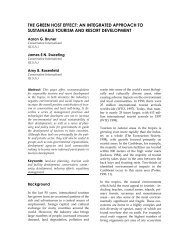Full document / COSOC-W-86-002 - the National Sea Grant Library
Full document / COSOC-W-86-002 - the National Sea Grant Library
Full document / COSOC-W-86-002 - the National Sea Grant Library
- TAGS
- nsgl.gso.uri.edu
You also want an ePaper? Increase the reach of your titles
YUMPU automatically turns print PDFs into web optimized ePapers that Google loves.
608<br />
precedent for such a decision. The leading case in Texas, <strong>Sea</strong>way<br />
Company v. Attv. General, concerned <strong>the</strong> right of <strong>the</strong> public to uso <strong>the</strong><br />
dry sand area of a beach located on Galveston Island. The primary use<br />
of <strong>the</strong> beach by <strong>the</strong> public was as a roadway. In finding an implied<br />
dedication, <strong>the</strong> court hold that tho owner had acted in such a way as to<br />
Induce a belief in <strong>the</strong> public that ha Intended to dedicate. Ha<br />
fostered this belief by fallng to protest public use over an extended<br />
time period. The public, in turn, accepted <strong>the</strong> dedication by continued<br />
use of <strong>the</strong> beach ovor time without asking permission. In addition,<br />
evidence was introduced that county authorities had contributed to<br />
maintenance of <strong>the</strong> beach since 1929. In assessing <strong>the</strong> weight to be<br />
given particular uses, tho court stated that maintenance and patrolling<br />
were "some evidence of an intent to dedicate" but that continued open<br />
use over time was <strong>the</strong> key element.<br />
Florida courts have added an interesting factor to <strong>the</strong> offer/acceptance<br />
elements of Implied dedication. It permits <strong>the</strong> public to acquire an<br />
easement in beaches through implied dedication if <strong>the</strong> owner of <strong>the</strong><br />
beach front parcel loses soaethlng by virtue of <strong>the</strong> public's use of <strong>the</strong><br />
beach. (Tona-Rama. 1974). The court did not elaborate upon this<br />
requirement. Georgia's rule necessitates that <strong>the</strong> public's use result<br />
in exclusion of tho landowner, a circumstance that would be almost<br />
Impossible to establish. (Lines. 1980). California has added a unique<br />
twist to <strong>the</strong> acceptance prong of <strong>the</strong> test. If <strong>the</strong> public use has not<br />
continued for more than five years, actual consent of <strong>the</strong> owner oust be<br />
proven. (Clon. 1974).<br />
Custom<br />
Ano<strong>the</strong>r common law doctrine available to protect public access to<br />
beaches is custom. Mississippi law on custom is sparse. And to date<br />
has been applied almost exclusively in business situations. Therefore,<br />
it is hard to draw analogies pertinent to beach access. A review of<br />
<strong>the</strong> applicability of <strong>the</strong> doctrine of custom by Oregon and Florida<br />
courts gives a clearer picture of <strong>the</strong> pertinent legal Issues.<br />
As defined in <strong>the</strong> leading beach access case in this country. State Ex<br />
Rel. Thornton v. Hoy, cuotoo Is "such a usage as by common consent and<br />
uniform practice has become <strong>the</strong> law of <strong>the</strong> place, or of <strong>the</strong> subject<br />
matter to which It relates." The court Identified seven requisites to<br />
support <strong>the</strong> cxlstenco of a custom. The right oust be ancient,<br />
continuous, free from dispute, reasonable, certain, obligatory, and<br />
consistent with law.<br />
Antiquity Is established through a showing of long and general usage.<br />
Here, public use of tha dry sand beaches of Oregon had existed since<br />
<strong>the</strong> time of tho early white settlers, as well as earlier by <strong>the</strong> Native<br />
American Indians. The next two requirements, continuity and freedom<br />
from dispute aro interrelated. Toge<strong>the</strong>r <strong>the</strong>y require consistent use by<br />
<strong>the</strong> public (again, one need not sunba<strong>the</strong> in January to be consistent)<br />
without Interruption by <strong>the</strong> landowner. "Reasonable" means usage<br />
appropriate to <strong>the</strong> land and <strong>the</strong> usages of <strong>the</strong> community. Hero,<br />
evidence that city police had intervened whenever people's behavior was<br />
inappropriate was hold sufficient. These showings should not bo<br />
difficult in tho coao of Mississippi's beaches.<br />
Certainty is a more difficult requirement because of <strong>the</strong> mobile<br />
boundaries of tho shore. Tho Oregon court held that "<strong>the</strong> visible



